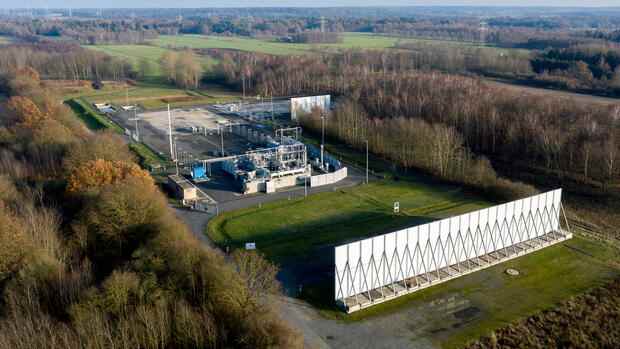In Lower Saxony there is massive resistance to natural gas production.
(Photo: dpa)
Berlin Natural gas production in Germany is falling continuously. In 2001, German natural gas production corresponded to 21 percent of the country’s demand, currently it is only five percent. In 2011, the share of domestic production in the German natural gas market was at least 14 percent, according to the Federal Association for Natural Gas, Oil and Geoenergy (BVEG).
The association explained that the natural gas supply from domestic production could even be increased by ten to 20 percent for a few years. What is needed, however, is social, political and official support. And that is currently missing.
The energy policy spokesman for the FDP parliamentary group, Michael Kruse, is therefore calling for the issue to be reassessed in view of the gas supply bottlenecks: “German gas makes us more independent of Russia,” says the FDP politician.
The German natural gas storage facilities are currently showing lower levels than ever before at this time of year. Germany imports a good half of its natural gas from Russia.
Top jobs of the day
Find the best jobs now and
be notified by email.
According to the BVEG, the decline in German production over the past few decades can be explained on the one hand by the natural decline in deposits, but on the other hand it is also the result of socio-political debates and the result of tighter approval procedures.
“It is correct: the potential of domestic funding is limited. However, this potential should also be used as part of the energy mix, because natural gas is particularly relevant for the transformation. As long as natural gas and crude oil are used in the country, domestic production should be maintained,” according to the BVEG.
Great political opposition to expansion of natural gas production
But reality looks different. Just a few days ago, the environmental committee of the Lower Saxony state parliament dealt with the issue. Lower Saxony has by far the most important deposits in Germany.
The agenda of the environmental committee included a motion for a resolution by the Greens in the state parliament and an amendment by the SPD and CDU, who form the governing coalition in Lower Saxony.
With the justification that the production in Lower Saxony is not clean, harbors relevant risks for water and soil protection and results in considerable burdens for people and the environment, the Greens reject the gas production in their application. They demand an immediate stop to new exploration and production permits via a change in federal mining law. The SPD and CDU amendment aims in a similar direction.
Dutch company wants to explore deposits in the border area of the North Sea
The practical consequences of the negative attitude are striking. For example, the Dutch company One-Dyas has been trying for months to obtain an exploration permit for a natural gas field in the German-Dutch border area of the North Sea.
On the German side, Lower Saxony is responsible for the approval. The state government of Lower Saxony and the state parliament of Lower Saxony reject the exploration project of the Dutch company. A final decision by the State Mining Authority is still pending.
But should Germany block domestic natural gas production in view of the tense supply situation? FDP politician Kruse considers the negative attitude to be wrong. “In the North Sea there are opportunities on German sovereign territory to develop new gas fields and to promote German gas,” said Kruse.
The aim must be “that we can produce up to ten percent of our annual gas requirements” ourselves. “I am therefore committed to talking to funding companies and our Dutch neighbors about what a good solution could look like here,” said Kruse.
Traffic light coalition against new permits
According to an Allensbach survey, 71 percent of the German population believe that natural gas should continue to be produced in Lower Saxony in the future. A majority of all sections of the population are in favor of continuing natural gas production, including supporters of the Bündnis 90/Die Grünen party (59 percent). The survey was commissioned by Wintershall Dea. The company promotes gas in Lower Saxony.
But Lower Saxony is not the only country standing in the way of plans to expand natural gas production. The traffic light coalition at the federal level should also have a hard time with Kruse’s demands. The traffic light coalition agreement states in the chapter on marine protection: “We do not want to issue any new permits for oil and gas drilling beyond the framework operating permits granted for the German North Sea and Baltic Sea.”
The sentence is a rejection of the One-Dyas project. The Dutch see the passage in the coalition agreement as an affront. The Dutch government has already expressed its incomprehension to the federal government.
Natural gas will be needed for many years to come
BVEG boss Ludwig Möhring points to the bridging function that he is convinced that natural gas will play in Germany for many years to come: “The level of natural gas demand in Germany does not depend on the volume of natural gas production, but on the specific extent of the use of natural gas in heating and heating electricity market,” said Möhring. Gas that is not produced and consumed in Germany must be imported. This increases dependency on imports.
The advocates of natural gas production in Germany also point out that natural gas production in Germany is subject to particularly strict regulations; it is therefore more environmentally friendly than in many other regions of the world.
More: Europe is arming itself with liquefied natural gas against possible consequences of the Ukraine crisis.


